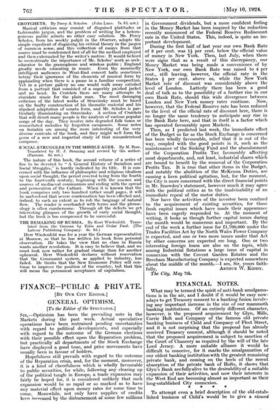CROTCHETS. By Percy A: Scholes. (John Lane. 7s. M. nat.)
Musical criticism may consist of disguised platitudes or fashionable jargon, and the problem of writing for a hetero- geneous public admits no other easy solution. Mr. Percy Scholes, from his weekly pulpit in the Observer, adopts the simple expedient of disguising his critical theory in the jargon of common sense, and this -collection of essays from that source must'be condemned first of all for the method employed and then extenuated -by the writer's motive; It would be hard to overestimate the importance of Mr. Scholes'.work as arch- educator to the gramophone and wireless public ; England greatly needs educating in music. Even the assumedly intelligent audiences in West-End concert halls sometimes betray their ignorance of the elements of musical form by applauding when there is a pause in a familiar composition. Yet in a picture gallery no one would walk away satisfied from a portrait that consisted of a superbly painted jacket and no head. In Crotchets there are many attempts to elucidate music for the plain man. The most damaging criticism of the latest works of Stravinsky must be based on the faulty construction of his thematic material and his slipshod adaptation of sonata form, and Mr. Scholes is par- ticularly illuminating on Stravinsky. A section of Crotchets that will divert many people is the analysis of various popular songs of the day. They resolve into degraded folk tunes or resuscitated melodies by forgotten composers. Some notes on Scriabin are among the more interesting of the very diverse contents of the book, and they might well form the germ of a new and impartial study of that misunderstood composer.






































 Previous page
Previous page